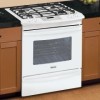Kenmore 3103 Use and Care Guide - Page 46
Before
 |
View all Kenmore 3103 manuals
Add to My Manuals
Save this manual to your list of manuals |
Page 46 highlights
Before You Call Solutions to Common Problems Before you call for service, review this list. It may save you time and expense. The list includes common occurrences that are not the result of defective workmanship or materials in this appliance. OCCURRENCE Range is not level. Cannot move appliance easily. Appliance must be accessible for service. Entire range or oven does not operate. Surface burners do not light. POSSIBLE CAUSE/SOLUTION Poor installation. Place oven rack in center of oven. Place a level on the oven rack. Adjust leveling legs at base of range until the rack is level. When range is level, cooktop may appear out of alignment if countertop is not level. Weak, unstable floor. Be sure floor is level and can adequately support range. Contact a carpenter to correct sagging or sloping floor. Kitchen cabinet misalignment may make range appear to be unlevel. Be sure cabinets are square and have sufficient room for range clearance. Cabinets not square or are built in too tight. Contact a cabinet maker to correct the problem. Contact builder or installer to make appliance accessible. Carpeting interferes with range. Provide sufficient space so range can be lifted over carpet. Gas line is hard-plumbed. Have a flexible C.S.A international approved metal appliance connector installed. Make sure cord/plug is tightly into outlet. Service wiring is not complete. Call 1-800-4-MY-HOME® (See back cover). Electrical power outage. Check house lights to be sure. Call your local electric company for service. Surface burners can be lit manually. Surface control knob has not been completely turned to LITE. Push in and turn the surface control knob to LITE until burner ignites and then turn the surface control knob to the desired flame size. Burner ports are clogged. Clean burners. See "Cleaning the Burner Grates, Burner Caps and Burner Heads" under General Cleaning. Range power is disconnected from outlet. Be sure cord is securely plugged into the outlet. Electrical power outage. Be sure the gas supply to the range is turned "ON". Burner ports are clogged. With the burner off, clean ports by using a small-gauge wire or needle. Surface burner flame burns half way around, Surface burner flame is orange. Scratches or abrasions on cooktop surface. Metalmarks. Brown streaks or specks. Moisture is present after cleaning. Lightly fan the flame and allow burner to operate until flame is full. Dry the burners thoroughly following instructions in the "General Care & Cleaning" section. Dust particles in main line. Allow the burner to operate a few minutes until flame turns blue. Salt air in coastal areas. A slightly orange flame is unavoidable. Coarse particles such as salt or sand between cooktop and utensils can cause scratches. Be sure cooktop surface and bottoms of utensils are clean before usage. Small scratches do not affect cooking and will become less visible with time. Cleaning materials not recommended for ceramic-glass cooktop have been used. See "Ceramic Glass Cooktop Cleaning & Maintenance" section under General Care & Cleaning. Cookware with rough bottom has been used. Use smooth, flat-bottomed cookware. Sliding or scraping of metal utensils on cooktop surface. Do not slide metal utensils on cooktop surface. Use a ceramic-glass cooktop cleaning cream to remove the marks. See "Ceramic Glass Cook'top Cleaning & Maintenance" section under General Care & Cleaning. Boilovers are cooked onto surface. Use razor blade scraper to remove soil. See "Ceramic Glass Cook'top Cleaning & Maintenance" section under General Care & Cleaning. Areas of discoloration with metallic sheen, Mineral deposits from water and food. Remove using a ceramic glass cooktop cleaning cream. Use cookware with clean, dry bottoms. 46












